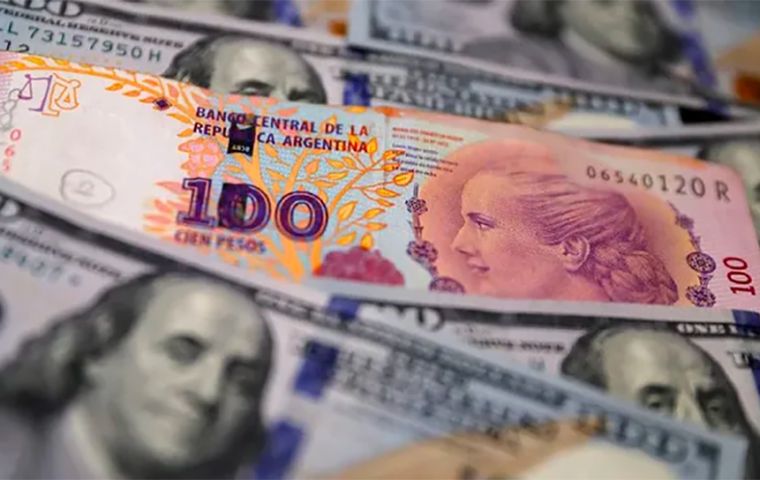MercoPress. South Atlantic News Agency
Argentina: “Blue” dollar reaches AR$ 600
 The parallel quotation went up amid threats of police raids to illegal exchange parlors where there was no trading for several hours until the rumors subsided
The parallel quotation went up amid threats of police raids to illegal exchange parlors where there was no trading for several hours until the rumors subsided The “blue” (a euphemism for “black market”) dollar in Argentina Wednesday pierced the AR$ 600 barrier for the first time just days ahead of Sunday's Simultaneous, Open, and Mandatory Primary (PASO) elections while the official quotation neared AR$ 300, it was reported in Buenos Aires.
The informal dollar rose AR$ 2 Wednesday and closed the day at AR$ 600. Thus, the gap between the parallel exchange rate and the official one stood at 110.4%. So far this year, the greenback went up AR$ 254 after closing last year at AR$ 346. Last week, the informal dollar rose AR$ 23, after a strong jump in July. Wednesday's was the highest monthly increase since April last when it jumped 18.7%.
Meanwhile, the credit card dollar with a 30% PAÍS tax and a 45% collection on account of the income tax stood at AR$ 521.17. For purchases over US$300, which have an additional 25% tax, it traded at AR$ 595.62.
Argentina's Central Bank (BCRA) sold US$ 94 million this Wednesday in the single and free foreign exchange market (MULC) to close the day with a negative balance, despite a substantial US$ 46.439 million contribution from the agricultural sector at the special rate of AR$ 340 / US$ 1 in force until Aug. 31.
The parallel quotation went up amid threats of police raids to illegal exchange parlors where there was no trading for several hours until the rumors subsided.
In this volatile scenario, wholesalers refuse to give their customers a price list for their products out of fear of a sharp increase in the unofficial exchange rate which is the one applied de facto to all transactions.
According to local analysts, the rise of the parallel dollar is due to the upcoming PASO elections, and to the seemingly neverending negotiations with the International Monetary Fund (IMF).




Top Comments
Disclaimer & comment rulesCommenting for this story is now closed.
If you have a Facebook account, become a fan and comment on our Facebook Page!